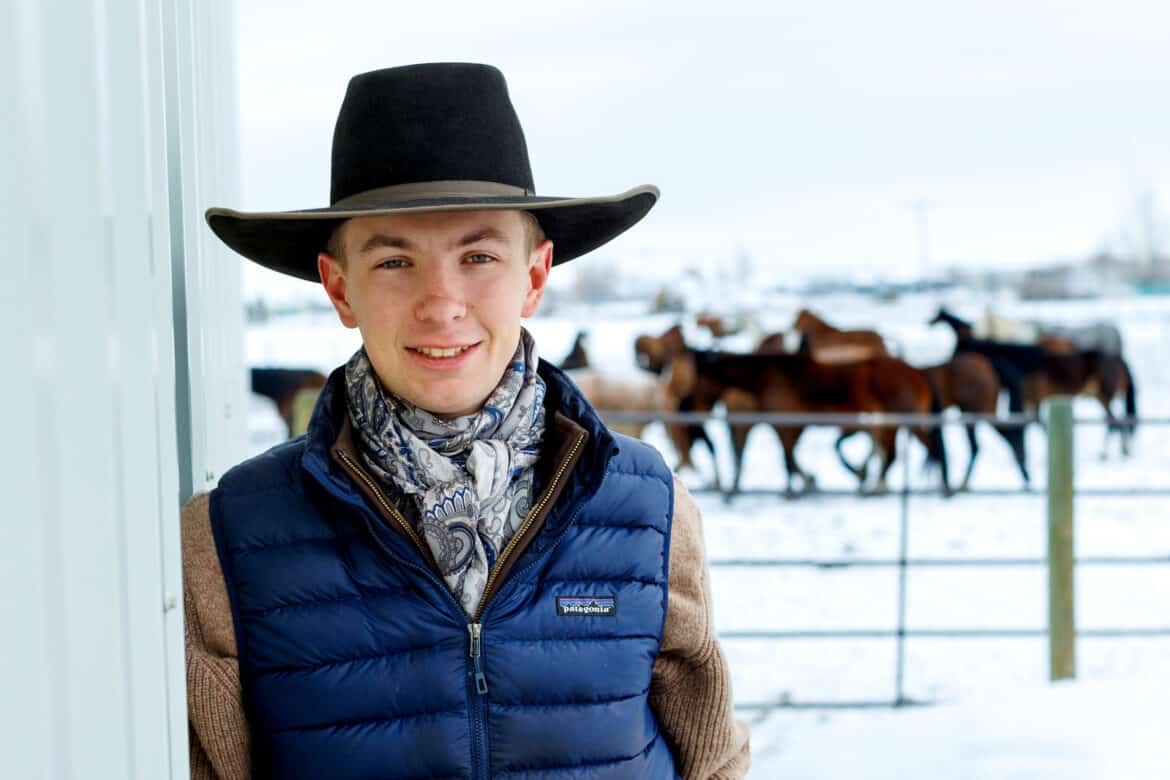BOZEMAN – Growing up on a guest ranch near Emigrant meant that Cayden Rose had no doubts about his career aspirations when he arrived at Montana State University in 2019. Now a graduating senior from the College of Agriculture’s Dan Scott Ranch Management Program, he’s confident he made the right choice.
“It was a perfect fit,” said Rose of the new degree program, which was introduced during the 2019-20 academic year and graduated its first student in December 2021. “I was excited about it when it came along.”
Rose was majoring in rangeland ecology at the time the new program debuted and was immediately intrigued by the Dan Scott program’s ranching systems degree, which is housed in the Department of Animal and Range Sciences. Students apply for the program during their sophomore year and study everything from business communications and economics to natural resource conservation and animal production. They also complete a two-summer internship at a working ranch in Montana, applying their classroom studies in a hands-on fashion.
The goal of the new program is to create well-rounded and well-prepared ranch managers, said director Rachel Frost.
“Today’s ranch managers have to be versed in much more than livestock husbandry,” said Frost. “They have to track finances, expand market potential, deal with personnel issues and work with a variety of conservation partners and government agencies. Preparing a person for that diverse of a job requires a unique approach to education, which is what the Dan Scott Ranch Management Program provides.”
Rose is a member of the Dan Scott program’s second graduating class and said the experience has been beneficial on several levels. He particularly notes his internship as a highlight. During the summers of 2021 and 2022, he worked on a cattle ranch outside of Twin Bridges, doing everything from driving cattle to implementing his own research for the ranch’s benefit.
“The project I worked on was looking into switching their calving season from spring to fall and looking at, economically, which one was more viable and a better fit their resources,” said Rose. “I can’t say enough about it. I learned more than I would have doing anything else. You learn the tools in college, but it was nice to be able to apply it somewhere and make that bridge.”
Rose said that during his internship, he found new avenues for answering questions. He was able to see the tangible results of management changes in a way that took theoretical knowledge and made it visible. He later had the chance to present his research on calving for other producers and industry experts at the Montana Nutrition Conference and Livestock Forum.
During his second summer on the ranch, he implemented an intensive grazing program and was gratified to see results such as increased daily gain in cattle and faster regrowth of forage in their pastures.
While Rose came to college with a background in ranching, elements of the ranching systems curriculum were new to him in a way that sparked his curiosity. As the agricultural industry changes and modernizes, he said the program has helped him prepare to be a multifaceted ranch manager, which he hopes will benefit the people, animals and natural resources that intersect in ranching.
“I think the thing that intrigued me about the Dan Scott program was the diversity of the courses that were offered,” said Rose. “All the different tools that you need to be able to successfully manage a ranch. You’re not just a steward of the land. You’re a businessman, you’re an accountant, you’re an animal scientist and everything else. It really does take everything and combine it all into one program, and that really drew me.”
Frost says that Rose has been a stellar example of why the program was created in the first place: to train a generation of ranchers and producers who are prepared to integrate science, business, conservation and production into continued success for one of Montana’s largest industries and the communities it supports.
“Cayden is one of those students who asks the right questions,” said Frost. “He is always looking for ways to add to his knowledge and apply what he has learned. With that mindset, I have no doubt that he will grow into an exceptional ranch manager.”
Rose will graduate in May with a degree in ranching systems and a minor in his original area of study, rangeland ecology. While he says he may take a week or so off to relax after graduation, he is ready and driven to join the workforce as a new ranch manager.
“I feel well prepared. Obviously, I still have a lot to learn, and I hope I never quit learning,” he said. “The connections I’ve made through college have been the highlight, whether it be through academics or just personally, it’s been the best years of my life. I’ve so enjoyed it. Without it, I wouldn’t have made any of those connections.”
###
MSU News Service
MSU Photo by Marcus “Doc” Cravens.


